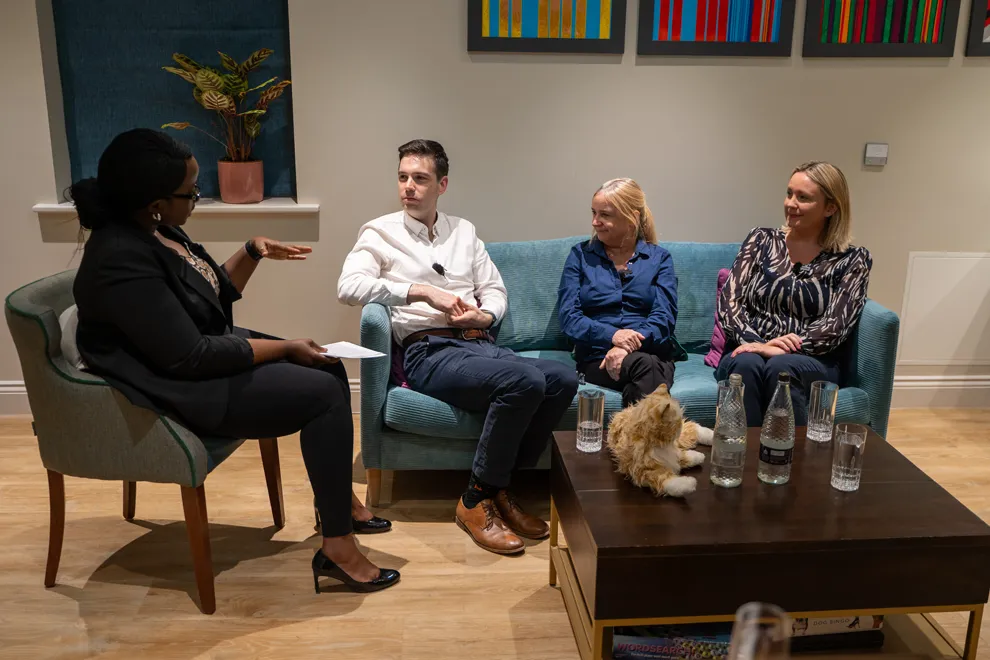Loveday was delighted to host the latest webinar on “The Importance of Social Connection in Ageing and Dementia” in collaboration with Annomo Health. This was the second webinar in the Loveday Q&A series of health webinars.
This highly informative and enriching educational experience was hosted by Dr. Chichi Menakaya, an Orthopaedic Surgeon and the CEO of Annomo Health who has extensive expertise in delivering uncompromised care and guidance to patients worldwide. Guest panellists included an industry-leading lineup of dementia and senior care professionals including:
- Dr. Tom MacLaren, Consultant Psychiatrist at Re:Cognition Health
- Mandy Andrews, Dementia Advisor at Age UK Kensington and Chelsea
- Louise Blezzard, Director of Well-Being at Loveday & Co
Together, this expert panel shared their wealth of knowledge, offering extensive insights into the complexities of ageing and dementia. Topics addressed included:
- The impact of social isolation on the mental health of older adults, especially those living with dementia.
- How long-term health conditions, bereavement and caring responsibilities contribute to decreased social interaction.
- Potential consequences of a lack of social connections on cognitive decline in the elderly population.
- Various interventions that can help people overcome social isolation.
Social connections play a crucial role in the lives of everyone, including the elderly and people living with dementia. Dementia is a neurological disorder that affects memory, cognitive function and daily functioning. Maintaining social connections can have numerous positive impacts on individuals with dementia:
Social interactions provide emotional support and companionship, helping individuals with dementia feel valued, loved and less isolated. Regular interactions with family, friends and caregivers can improve their mood and overall sense of well-being.
Engaging in conversations and activities with others can stimulate cognitive functions. Social interactions encourage mental engagement, memory recall and problem-solving skills, helping to slow down the progression of cognitive decline.
Social engagement can often reduce restlessness, agitation and behavioural challenges that individuals with dementia may experience. Meaningful interactions and socialising can provide a sense of structure and purpose, reducing the likelihood of disruptive behaviour.
Regular social interactions can improve an individual’s overall quality of life. Engaging in hobbies, interests and activities they once enjoyed with others can contribute to a sense of fulfilment and happiness.
Maintaining social connections can help individuals with dementia retain and improve their communication skills. Interacting with others encourages verbal and nonverbal communication, which can be important for maintaining relationships and expressing needs.
Social connections benefit not only those with dementia but also their caregivers. Socializing can provide caregivers with respite, emotional support and a network of people who understand their challenges.
Sharing stories, memories and experiences with loved ones and friends can help individuals with dementia maintain a sense of self and a connection to their past.
Engaging in social activities often involves physical movement and sensory stimulation. This can have positive effects on physical health, including improved mobility and coordination.
Loneliness and isolation are common challenges for individuals with dementia. Social interactions help combat these feelings by providing a sense of belonging and inclusion in their community.
Having a support network can help individuals with dementia and their caregivers cope better with the challenges that the condition presents. Supportive social connections can contribute to greater resilience and adaptability.
Creating opportunities for social interactions, organizing group activities and involving individuals with dementia in community events can foster meaningful connections. It’s important for family members, friends and caregivers to be patient, empathetic and understanding, as communication abilities may vary. Overall, social connections can significantly improve the well-being and quality of life for the elderly and for those living with dementia.
Discover practical tips by this esteemed panel of professionals in this insightful webinar here.






